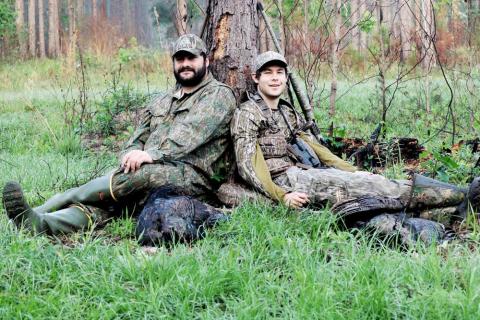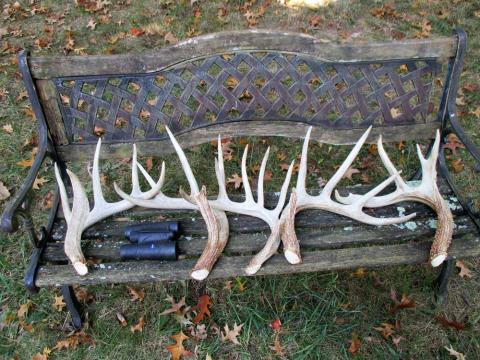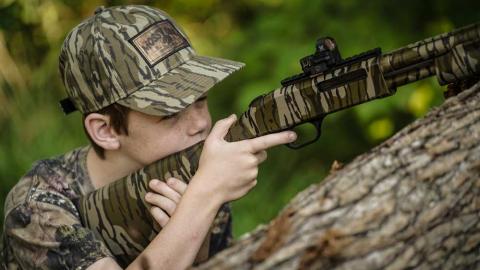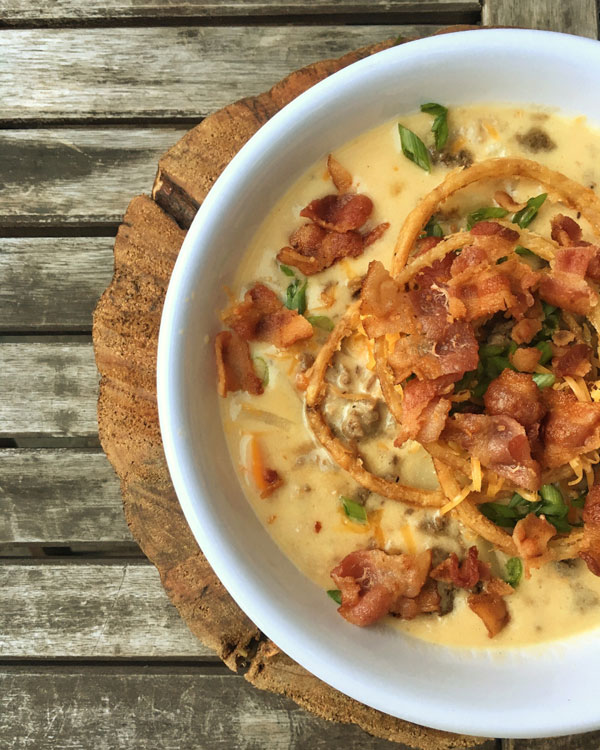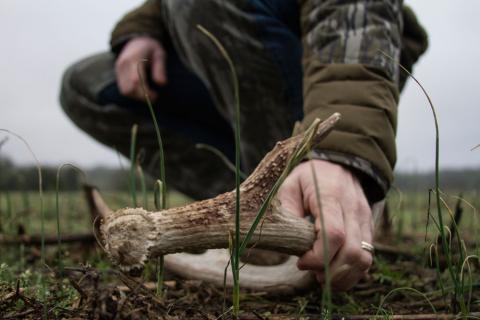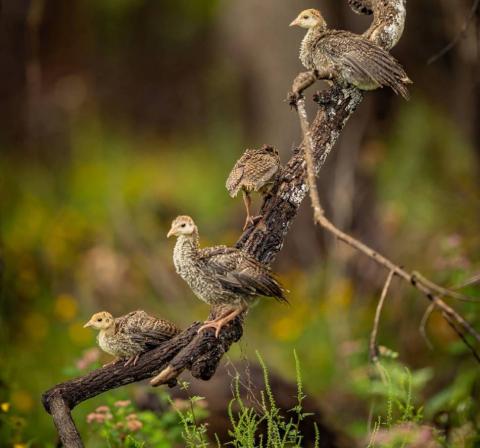
The following is an except from Jim Mize's hunting and fishing memoir, "The Jon Boat Years." Available to purchase here.
Blurred Memories
Ducks fly through my memories. The set wings of a mallard with dangling orange feet have become a blended image of all the mallards taunting me over the years. Places fade. Directions not written have erased. Still, one season remains crisp in my mind for its novelty, newness, and absurdity. A mountain kid studying at Virginia Tech, I was introduced to a new professor who grew up in South Louisiana and wanted to find some ducks. We quickly reached an agreement with me providing the “where” if he’d provide the “how.” Somewhere in the fine print was a clause I missed on how much stuff I’d help carry but be well fed for it. The cast of characters included Fontenot, nicknamed after listening to his Justin Wilson albums, Fontenot’s wife, and Duke. Two things you should know about the wife and the dog. First, she was also Cajun and whatever made it to the game pot was smothered in Cajun seasonings in a deceptive brown roux and served over rice. The first bite I took of smothered game singed my hair from the inside and not one particle has fallen out since. She might have become rich with this preventive for baldness had we known it sooner. Second, Duke came from South Louisiana as well and had a personality like his owner. Sure, the pup was sleek and strong, but he hunted hard and played harder. On the drive to the duck blind he’d lie in the back seat of the old Dodge crunching aluminum beer cans until they were gone. Maybe he passed them, but I don’t remember ever seeing the shrapnel.
Once that season, I stayed over to avoid an early drive after a late night, sleeping in the basement with Duke who charged me one boot for the privilege. He gave me a partial refund in the morning, if you count the sole and strings as change. On another night before a hunt, Duke found a case of liquor in the basement, removed only the sherry, four bottles out of a dozen others, and chewed the tops off and lapped up the contents. A hungover Lab is a still partner in a duck blind.
Virginia’s duck season kicked off in the early fall with a few days to wave off gnats while you throw your barrel at racing wood ducks. We hunted the New River in stretches flat enough to wade, but wide enough the woodies could easily avoid us. Still, we did our homework, made some good guesses on flight plans, and dropped our first ducks of the season. I replenished my fly-tying supplies with a few years’ worth of flank feathers and smothered duck made me look forward to the main season.
Opening day for the November season was like one-card draw from a poker deck. You had fifty-two choices for weather, and we drew hard rain. The river rose too high to hunt the islands we’d used in wood duck season and the mallards needed slower water to sit in. We found a bend where the water backed up and the decoys would just about hold. Ours were weighted with railroad spikes that we picked up walking the tracks to and from the blind. They held the decoys well but carried like a sack of rocks. Where the river washed up, the bank lay up against a stand of oaks. Brush from older floods piled up into a natural blind, so all we had to do was set decoys in high water in the dark. The usual duck-hunting stuff.
At first light, Fontenot quacked a few times and mallards started dropping through the trees. Not out where we could shoot mind you, but back behind us on wet ground. Puddles full of acorns may have drawn them in. But we quickly began to stalk and jump shoot mallards in the woods. Every flushed mallard caught us by surprise. They came up beside us, at our feet, and behind us in places where no duck should have flushed. Duke found what we hit, but after walking through flooded timber with ducks flushing like sprung mousetraps, our nerves were wound tight as the spring on a cheap watch.
Having walked the woods, we circled back up the river’s edge to our blind. I blame the next part on our flooded ducks, but one of our decoys had worked downstream in the rising current and the railroad spike had snagged on an underwater tree root. Whenever a surge of water or debris pulled the cord, the decoy tipped up like a feeding duck. Fontenot saw it and began to stalk. I recognized what had happened before Fontenot did since this was one of my decoys, but quickly decided a sacrificed decoy would be a small price to pay for a tale of Fontenot taking ducks on the water. I watched as his gun rose, my sides already quivering from suppressed laughter, and when the duck tipped one last time, his safety clicked off. When the decoy bobbed back up, I figured it a goner. But in that split second, Fontenot realized something was wrong with a mallard that didn’t flush, or he just made a sporting decision. Hearing my snickering, he grabbed the decoy, mumbled some Cajun insults my way, and we laughed all the way back to the blind.
The cold came in December that season. To the east, the Chesapeake Bay froze solid, and first responders ran food to the islanders by helicopter. The New River was colder yet. The water froze in sheets that would break off in the current and floes of ice floated down and piled up on rocks, sometimes on edge, with jagged horizons replacing rounded boulders. To the north, the New River dumps into the Ohio River, so our best hunting usually came when it was cold someplace else, like Ohio. The freeze turned the ducks south in variety and numbers. Black ducks drew us into single-digit weather, where our shivering forms were no more than dark huddling shapes in sleet that always found the crease between your cap and collar, rolling like pins and needles when it found bare skin. On one of these mornings, Fontenot was teaching, so I went ahead and set the decoys. His plan was to follow after class.
Sitting on a bucket in an ice-glazed blind, I remember the sun rose brilliantly but without heat. Fog rolled in wisps down the river like Lee’s army retreating. Except for the crows, nothing living moved. The water gurgled, the ice groaned, an occasional limb snapped like it had finally given up. I remained motionless until Fontenot arrived. His first question was something like, “Seen any ducks?” and my answer was something like, “Grrfntly.” My ability to speak had evaporated with my body heat, and I learned of an early sign of hypothermia.
Stomping in a sunny spot and drinking hot liquids was enough to get me back in the hunt, but it was a useful lesson. To this day, I talk to myself if for no other reason than to check my physical state. Of course, it leaves a poor impression of my mental state.
The cold up north continued to push nonresident ducks our way. One morning, I was teased by a flock of over forty pintails, circling too high to shoot, dipping for a closer inspection of my decoy set, and whistling every time they flared. But it was big ducks that drew us out during the holidays, the mallards and the black ducks, toughened by their trip south. We swore they were Canadians and bigger and tougher. But they ate well, and the Cajun spices were beginning to insulate my blood like antifreeze.
At season’s end, the cold broke with a warm rain that brought the New River to its highest point of the season. All the ice floes melted, and the runoff turned riffles into rapids. Only fools would hunt the last day and Fontenot convinced me to go. We loaded the gear and Lab into his pirogue, strapped on life jackets, and began to wade and swim to our favorite island. With one of us hanging on each end, the pirogue carried us through the holes and eventually our feet found rocks. When we reached the island, the water was too strong for our decoy weights to hold, so we were constantly going to the lower end of the island to retrieve and reset them at the upper end.
Sometime in the afternoon, a sole mallard flared over the decoys and Fontenot dropped him. Duke retrieved and the season ended. We began to pick up decoys and Duke dragged in his share as was his custom. The only time he ever brought in a decoy was when we did. He piled them on the bank like it was part of his job. In the fading light, we had to push the pirogue back to the bank, up and across current, and the going was slow. We approached the bank well past shooting time. In the darkness, a flashlight flickered. Funny how if you hunt with another fellow enough, you learn to recognize his flashlight. Maybe by its dimness or a red band of plastic that glows around the bulb, but we knew this was a hunting buddy who saw our car and stopped to check on us well after normal quitting time.
In typical what-the-hell fashion, Fontenot greets him by shouting, “There’s the game warden . . . let’s shoot him!” At this point, a considerably brighter beam came on that was obviously government issue. It drew us to the bank like a Star Trek tractor beam. As it turns out, our buddy was not so much concerned about our well-being as our running into the game warden unannounced. After all, one of us had almost shot a decoy on the water earlier in the season.
Our season ended with a grumpy game warden going through all our decoys, sacks, licenses, and pirogue looking for a violation to write us up on. He checked our magazines, inspected every shell, and counted our duck three times. Then he mumbled like he had hypothermia and left.
Seasons since struggle to compare. Ducks have jumped in front of me from Rocky Mountain beaver ponds and streaked by Chesapeake Bay blinds, occasionally falling. Retrievers have broken ice on valiant retrieves and worked against tides to drop ducks at my feet with a grin and their tongues hanging. But all the memories blur together like graying black-and-white Polaroids in a photo album, save for one season with a Cajun duck hunter, a dog who defined retrievers for me, and a Cajun lady who introduced me to smothered duck. So, when the wind blows and my joints creak, I’ll pour a brandy and remember the one season that stands crisp in my memory and ask forgiveness of a game warden who thought we threatened to shoot him.
Nationally recognized and award-winning writer Jim Mize captures the true essence of sport and living life to the fullest in this collection of stories about his outdoor escapades. In tales spanning more than five decades, Mize invites readers into carefree days hiking through the Colorado Rockies with a fly rod and leisurely casting poppers to bluegill on small southern ponds. Mize's humorous stories entertain and return readers to their own turkey hunting or creek-fishing excursions. Black-and-white drawings from artist Bob White illustrate stories filled with laughter, quiet contemplation, and wonder.






















